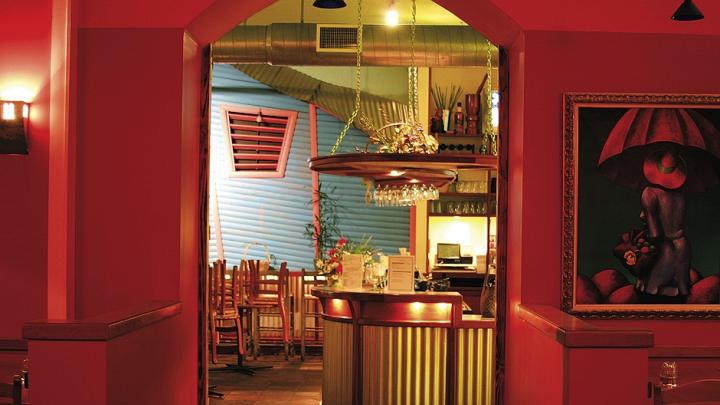To experience, within a few miles of home, a completely different slice of life through the cuisine of a foreign country, is a wonderful thing. Such was true of our trip from Medford to Merengue.
This Latin American restaurant bubbles with life, from the walls dressed in fuchsia, royal blue, and aqua to the glowing bar lights, from the giggling children slurping up their caramel flan to the jazzy guitar music, fairly danced to by servers handing out Red Bull and batidos oasis (a thick fruit shake—try the guava) along with the usual cervezas and a nice array of Chilean vinos rojos.
Nearly everyone here speaks Spanish, but the menu has English translations of dishes like mofongos (mashed plantains), gandules con coco (coconut with green pigeon peas), and cerdo frita (fried pork). Listening to the language around us, with ceiling fans whirring above and the curtains pulled tight against the cold New England winds, we could have been in Cuba, Puerto Rico—or the Dominican Republic, where owners Nivia and Héctor Piña grew up. “We want people to come inside the restaurant and not be in Roxbury,” Nivia says, “but to feel the colors and be transported back to their homes, to their mom’s and grandma’s cooking—and for other cultures to come in and try our food.” Merengue, the island’s traditional dance form, she says, “is a happy dance with happy music that makes you want to move your body, go on vacation—have some fun.”
Responding to high demand for their home-style fare, the Piñas expanded Merengue in 2001 into two large rooms that now comfortably seat 90. Dominican food enjoys a rich heritage, starting with the indigenous Taino Indians and reflecting later Spanish and African influences. Every night, Merengue’s diners hail from many of the countries—El Salvador, Haiti, Cape Verde, Colombia, and Puerto Rico —that “share some of the same menu,” Nivia says: “a lot of seafood, coconut, rice and beans, pineapple, and goat.” And, of course, plantains. Green ones, yellow ones, mashed, fried, boiled, and broiled—these starch-heavy fruits “are like bread to us,” she adds.
We had our yellow ones, less sweet than bananas, sautéed ($2.50), along with a sampler ($10) of chewy, bite-sized fried meats, green plantains, and cassava (a mainstay crop for the island). The seafood combination platter ($19), served over soft yellow rice with a smoky coconut sauce, offered fresh lobster, shrimp, mussels, and tender octopus. The juicy red snapper fillet ($13) came smothered in a tangy garlic and oil sauce, just right to open the sinuses, and singed red and green peppers.
For dessert, please try the tres leches cake ($3.50). Made with condensed, evaporated, and whole milks, this custardy treat is a primal mouthful of motherly love.
And the next time you start pining for a Caribbean jaunt, forget about booking a cruise or making a reservation at a resort. Come explore the real thing, in a neighborhood near you.








